
Trends in economics, immigration and mobility policy

Putting home ownership within reach for a diverse workforce

Administrator accountability: 5 questions to evaluate outsourcing risks
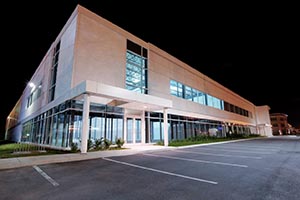
Commercial real estate in 2020: Keeping up with the pace of change

High-yield bond issuance: 5 traits lawyers should look for in a service provider

Easier onboarding: What to look for in an administrator

3 tips to maintain flexibility in supply chain management

Insource or outsource? 10 considerations

Refining your search for an insurance custodian

4 questions you should ask about your custodian

Preparing for your custodian conversion

Service provider due diligence and selection best practices

Tactical Treasury: Fraud prevention is a never-ending task

Webinar: Empower your AP automation with strategic intelligence

Evaluating interest rate risk creating risk management strategy
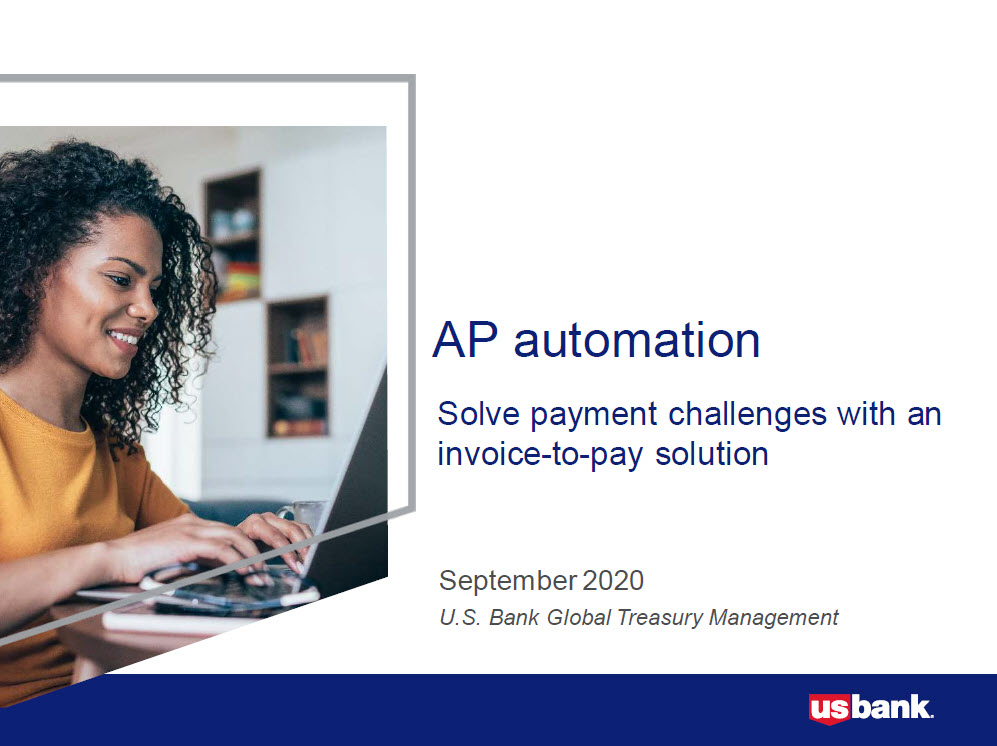
Webinar: AP automation—solve payment challenges with an invoice-to-pay solution
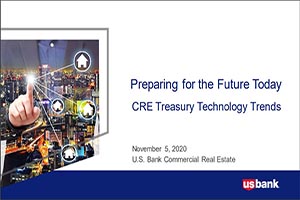
Webinar: CRE technology trends
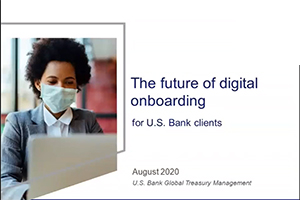
Webinar: The future of digital onboarding for U.S. Bank clients

Complying with changes in fund regulations

Protecting your business from fraud

Business risk management for owners of small companies

Webinar: CSM corporation re-thinks AP

Adjust collections to limit impact of USPS delivery changes

Addressing financial uncertainty in international business
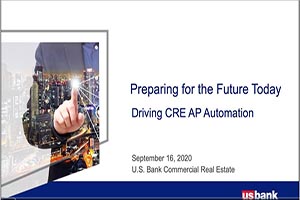
Webinar: AP automation for commercial real estate

The benefits of payment digitization: Pushing for simplicity

5 winning strategies for managing liquidity in volatile times

Artificial intelligence in finance: Defining the terms

The surprising truth about corporate cards

The future of financial leadership: More strategy, fewer spreadsheets

Choosing your M&A escrow partner

Employee benefit plan management: trustee vs. custodian

Tapping into indirect compensation to recruit foreign talent

Why other lenders may be reaching out to your employees

Why retail merchandise returns will be a differentiator in 2022

High-cost housing and down payment options in relocation

The client-focused mindset: Adapting to differing personality types

The client-focused mindset: How to network effectively

The client-focused mindset: What do clients expect?

Flexibility remains essential for public sector workforces

Automated escheatment – learn how to prevent and resolve unclaimed property
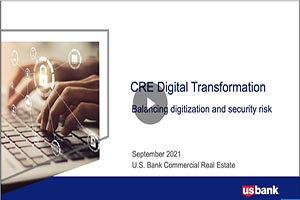
Webinar: CRE Digital Transformation – Balancing Digitization with cybersecurity risk

Webinar: Reviving mobility, what to expect

Webinar: DEI tips for transforming your mobility program

Overcoming the 3 key challenges of a lump sum relocation program

For today's relocating home buyers, time and money are everything

10 tips on how to run a successful family business

Crypto + Relo: Mobility industry impacts

Empowering team members

How entrepreneurs can plan for what matters most

Business tips and advice for Black entrepreneurs

Talent acquisition 101: Building a small business dream team

Opening a business on a budget during COVID-19

How to test new business ideas

How to get started creating your business plan

How to redefine challenges with business collaboration

8 ways to increase employee engagement

The role of ethics in the hiring process

The costs of hiring a new employee

How to hire employees: Employee referral vs. external hiring

Tips for building a successful customer loyalty program

Give a prepaid rewards card for employee recognition

Checklist: Increase lead generation with website optimization

How to reward employees and teams who perform well

5 steps for creating an employee recognition program

Gift cards can extend ROI into 2022

Omnichannel retail: 4 best practices for navigating the new normal

Is your restaurant Google-friendly?

5 principles for avoiding ethics pitfalls on social media

3 simple brand awareness tips for your business

How a small business owner is making the workplace work for women

5 tips for helping employees raise ethics concerns

What you should know about licensing agreements

The growing importance of a strong corporate culture

7 uncommon recruiting strategies that you may not have tried yet

Business credit card 101

How to apply for a business credit card

Meet your business credit card support team

Prioritizing payroll during the COVID-19 pandemic

How jumbo loans can help home buyers and your builder business

Break free from cash flow management constraints

5 tips for managing your business cash flow

Improve online presence your business

How Shampoo’ed is transforming hair and inspiring entrepreneurs

The San Francisco bridal shop that’s been making memories for 30 years

How Al’s Breakfast is bringing people together

Celebrity Cake Studio’s two decades of growth and success

In a digital world, Liberty Puzzles embraces true connection

How a bar trivia company went digital during COVID-19

How a travel clothing retailer is staying true to its brand values

How community gave life to lifestyle boutique Les Sol

How a group fitness studio made the most of online workouts

How to build a content team

How Wenonah Canoe is making a boom in business last

How (and why) to get your business supplier diversity certification

Use this one simple email marketing tip to increase your reach

Year-end financial checklist

5 tips for being a great board member

How I did it: Joined a board of directors

Tips for navigating a medical hardship when you’re unable to work

Webinar: Uncover the cost: International trip

How having savings gives you peace of mind

Allowance basics for parents and kids

Tips to overcome three common savings hurdles

Helpful tips for safe and smart charitable giving

5 tips to use your credit card wisely and steer clear of debt

30-day adulting challenge: Financial wellness tasks to complete in a month

Travel for less: Smart (not cheap) ways to spend less on your next trip

Real world advice: How parents are teaching their kids about money

How to stop living paycheck to paycheck post-pay increase

Practical money tips we've learned from our dads

How to cut mindless spending: real tips from real people

6 ways to spring clean your finances and save money year-round

How to increase your savings

5 tips to use your credit card wisely and steer clear of debt

Managing the impacts of appraisal gaps in a hot housing market

How to spot a credit repair scam


